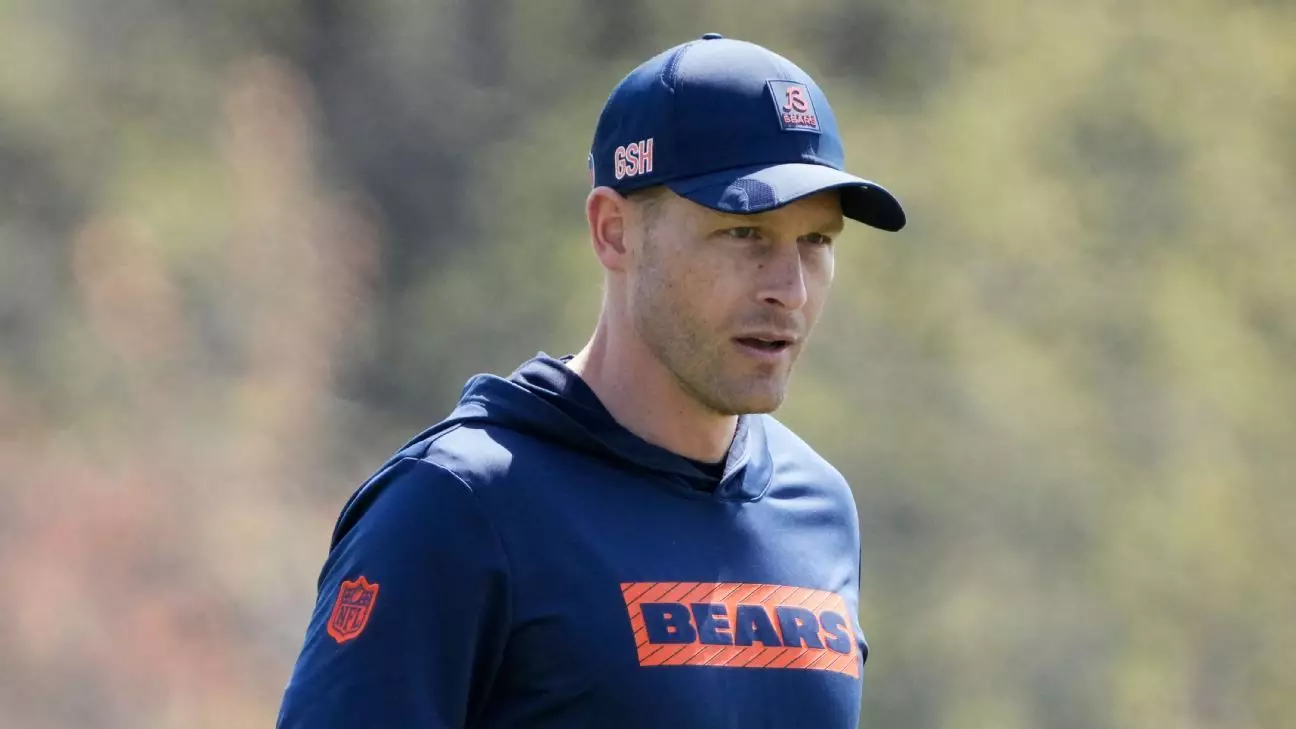The Chicago Bears have long been synonymous with football history, yet their reputation for developing quarterbacks has been nothing short of disastrous. New head coach Ben Johnson sees this unsettling legacy not as a daunting challenge but as a golden opportunity. With the Bears recently drafting Caleb Williams, a talent laden with potential, the franchise stands at a pivotal juncture where the narrative can be rewritten. Johnson has expressed a palpable enthusiasm about changing the prevailing story of quarterbacks “dying” in this organization. His approach is refreshing, leaving fans to wonder if this might indeed be the dawn of a new chapter.
While the shadows of past failures loom large, there’s a growing sense that Johnson is eager to embrace the unpredictability that comes with coaching such a heralded prospect. His perspective invites a more optimistic outlook, suggesting that every setback can lead to a remarkable comeback. The prospect of molding Williams into a franchise quarterback could not only restore confidence in the Bears’ ability to develop talent but could also renew the connection between the team and its loyal fans.
Lessons from Caleb Williams’ Rookie Season
The publication of excerpts from Seth Wickersham’s insightful book “American Kings: A Biography of the Quarterback” has shed light on several disconcerting aspects of Williams’ initial experience in Chicago. Candidly, both the star quarterback and his father, Carl, expressed reluctance about entering a franchise with a history muddied by quarterback mishandlings. These revelations were a glaring reminder of the potential psychological and emotional toll that such previous failures could have on an up-and-coming player. The reality is clear: for every opportunity in the NFL, there are inherent pitfalls that can stifle the development of even the most talented prospects.
However, Johnson’s arrival brings a different tone. His proactive communication with Williams, following these troubling insights, demonstrates a readiness to address the challenges of the past head-on. Rather than dwelling on the struggles Williams faced last season — such as a lack of instructional support from coaches and his distinct need for accountability — Johnson emphasizes the importance of trust and collaboration moving forward. His upbeat outlook could act as a catalyst for growth, highlighting the significance of creating a conducive environment for players to thrive.
Accountability: The Key to Development
During his rookie season, Caleb Williams voiced concerns about needing more rigorous coaching and accountability, hinting at a palpable disconnect between him and the coaching staff. Johnson recognizes that this is an essential component that could help reshape the narrative. By fostering a culture where accountability is not avoided but embraced, Williams and his teammates can begin to flourish. Johnson’s philosophy seems to hinge on mutual respect, understanding, and the much-neglected aspect of holding players accountable for their performance.
This emerging relationship signals a fundamental shift away from previous misunderstandings that plagued the franchise. With Johnson’s emphasis on building rapport, it’s plausible that Williams will feel more empowered to express his needs and expectations. Establishing open communication is undoubtedly critical in transforming a once stagnant atmosphere within the team. If both Johnson and Williams can cultivate this dynamic, the correlation could yield significant improvements in player performance and, ultimately, team success.
A Forward-Looking Vision for the Bears
Johnson’s proclamation of writing a new chapter for the Chicago Bears in 2025 aligns with a broader vision of recovery and transformation. His past experience as the offensive coordinator for the Detroit Lions — a team that was also in dire need of revitalization — positions him as a leader who is familiar with the nuances of strategy and mentorship. The Bears are banking on his ability to not just manage but inspire.
This collaboration could be pivotal for Williams’ growth, as Johnson advocates for a holistic approach that encompasses the individual athlete’s aspirations while integrating them within the framework of team dynamics. Creating a culture of empowerment and shared responsibility will not only change the fate of Williams, but may also awaken the Bears’ dormant ambitions within the NFC North.
In an organization where success often feels like a distant memory, the setting sun might just give way to a new dawn, one where the ghosts of the past are exorcised through commitment, communication, and a refreshing collective identity. Coach Johnson’s optimistic narrative may be just what the Chicago Bears need to reclaim their rightful place in the annals of NFL history.

